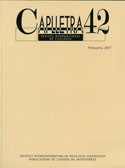Observacions sobre la posició dels subjectes postverbals en català i castellà
DOI:
https://doi.org/10.7203/caplletra.42.4825Paraules clau:
postverbal subject, cartography, manner adverbs, weak pronouns, quantifiers, restructuring Resum
Resum
This is a comparative study of the different positions of postverbal subjects in two closely related languages that nevertheless show clear differences in this respect.
The comparative study will allow us to reject the idea that postverbal subjects in Romance languages are in a unique in situ position Spec VP as has been proposed recently (Motapayane1995, Ordóñez 1998, Costa 2000, Alexiadou i Anagnostopoulou 2001, Cardinaletti 2001). On the contrary, this study will show clearly that there is a need for two positions for postverbal subjects in order to understand the parametric differences between Catalan and Spanish. The general hypothesis will be that the subjects can access a higher Spec of what I will call SubjP, but not Catalan. This will
account for the different distribution of subjects respects to adverbs, quantifiers, and restructuring contexts. This paper clearly shows that a finer and richer functional structure above VP and below the final landing site of subjects is needed to account for the differences between Catalan and Spanish. Therefore, this paper is another contribution to the cartographic studies initiated by Rizzi (1997).
 Descàrregues
Descàrregues
Descàrregues
Publicades
Com citar
-
Resum511
-
PDF270
Número
Secció
Llicència
L’autor o autora que adrece un treball a la redacció de Caplletra perquè siga publicat ha de ser la persona titular legítima dels drets d'explotació. La legitimació per a la publicació del treball ha d’incloure també les imatges, les taules, els gràfics i altres materials que puguen complementar el text, amb independència de si n'és l'autor o autora.
Copyright. Quan publica el treball en la revista, l'autor o autora cedeix a Caplletra. Revista Internacional de Filologia els drets d'explotació (reproducció, distribució i comunicació pública), tant per a l'edició impresa en paper com per a la versió electrònica, que serà accessible mitjançant la xarxa Internet.
Tots els treballs publicats en Caplletra es troben sota una llicència Creative Commons del tipus Reconeixement-NoComercial-SenseObraDerivada 4.0.
RESPONSABILITAT
Caplletra. Revista Internacional de Filologia no s'identifica necessàriament amb els punts de vista mantinguts en els treballs que publica.
Caplletra. Revista Internacional de Filologia declina tota responsabilitat derivada de qualsevol vulneració eventual dels drets de propietat intel·lectual que poguera ser duta a terme pels autors o autores.






